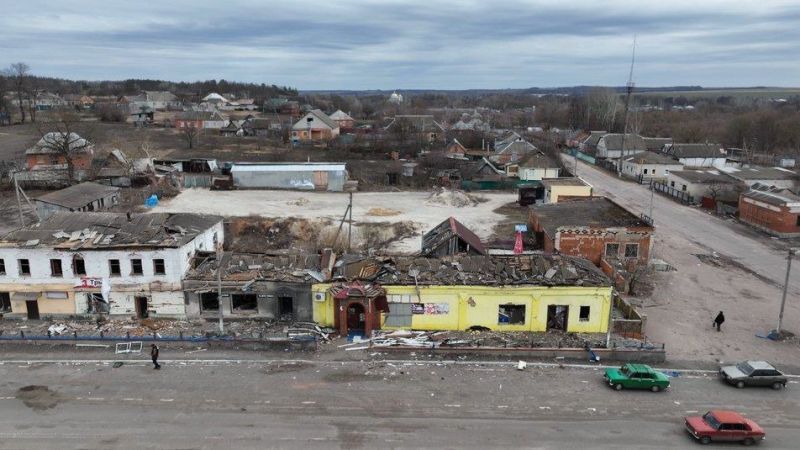
As the war in Ukraine continues, cooperatives around the world are intensifying their relief efforts in the country while welcoming displaced Ukrainians.
The National Agricultural Cooperative Federation (NACF) of Korea has recently partnered with Polish and Turkish cooperatives to assist their counterparts in Ukraine and Poland, and help displaced Ukrainians.
NACF vice-chair Jae-sik Lee met the President of the National Cooperative Council (NCC) of Poland, Mieczysław Grodzki, and the Chair of the Ukraine Central Union of Consumer Societies (Ukoopspilka/Coop Ukraine), Illia Gorokhovskyi, on 9 May, in Warsaw, Poland.
NACF donated €100,000 to humanitarian efforts in Ukraine.
Mr Lee said: “Through this donation, NACF seeks to provide a model for other global cooperatives and demonstrate our leadership in the global cooperative movement in our capacity as the ICAO President’s cooperative.”
Meanwhile, Co-op Ukraine’s stores continue to serve their members and communities.
In a recent interview with Co-op News, Mr Gorokhovskyi said: “Our people worked as long as necessary, no one said that they had exceeded the hours of work established by law. Many volunteered … In such a difficult time for Ukrainians, there is no question: how many hours should I be at work? The question is different: what can I do as much as possible? There are many examples of our workers taking refugees into their homes”.
The ICA has also launched a fundraising appeal for Ukraine and is encouraging members to join efforts to mitigate the hardships being inflicted on the Ukrainian people.
Likewise, the Worldwide Foundation for Credit Unions (WFCU) has raised US $1.37 million for its Ukrainian Credit Union Displacement Fund. Donations came from more than 1,200 individuals, nearly 200 credit unions and dozens of credit union leagues, associations, foundations and other industry partners.
In the USA the National Co+op Grocers (NCG), the Cooperative Development Foundation (CDF) and NCBA CLUSA raised $163,998.30 to support Ukrainian cooperators. HomeWorks Tri-County Electric Cooperative, headquartered in Portland, Michigan, is urging rural electric cooperatives to join this effort, and has pledged a 100 match for all donations up to $15,000 made by 30 April. NCBA is working with two organisations in Ukraine - Coop Ukraine and PARD - to begin distributing funds to those most in need. Donations can be made online.
European cooperatives have been supporting relief efforts in Ukraine via donations to NGOs and Ukrainian cooperatives. Meanwhile, cooperatives in states neighbouring Ukraine are working to provide shelter, food, work and other immediate support to refugees arriving. Similarly, Fairbnb.coop is creating a platform that can be used by NGOs and humanitarian organisations to find hosts for refugees.
Israeli co-operators are also involved in providing humanitarian relief in Ukraine and neighbouring countries, working with IsraAid. Initiatives include setting up a Humanitarian Logistics Hub in Tulcea, Romania and providing protection, education, and medical support to refugees arriving in Palanca, Moldova, 50km from Odesa, Ukraine’s largest port city.
Mr Dor said: “We decided to expand our activity to Tulcea, Romania, to create a Humanitarian Logistics Hub to streamline aid donations and ensure supply chains of essential humanitarian items, including medical supplies, clothes, and food, to southern Ukraine. Tulcea, separated by the Danube River from the Ukrainian city of Izmail, provides access to supply routes across south Ukraine, including Odesa, Kherson, Mykolaiv, and Zaporizhzhia regions. The Tulcea Humanitarian Logistics Hub will be able to process donations from anywhere in the world and send them on to Ukrainian civilians in urgent need. We were also building a digital warehouse management system with the Israeli technology company Monday.com, which will ensure up-to-the-minute tracking of donations and shipments in and out of the hub.
“Truckloads of humanitarian aid have already departed from the warehouse towards Ukraine as the hub is prepared for incoming donations worldwide. In addition to urgently needed food and clothes, the hub and partnership will help ensure Ukrainian hospitals have adequate access to essential medical supplies, including those donated by the cooperative movement directly.”
Cooperatives are also looking to provide logistic support to Ukraine, and are working with Coop Ukraine who provided a list of essential goods and items they need.

According to Mr Dor, NGOs and cooperative support will help sustain long-term recovery. “Many of those displaced face long-term obstacles that include (but are not limited to) psychological trauma, gaps in education and learning, linguistic barriers, securing sufficient income, and much more. This is not a project or crisis that could be addressed by one organisation. We need many partnerships, and for us, the collaboration with the local Moldovan community, the local community in Romania, cooperatives in Israel and worldwide, and of course, our many other Ukrainian partners, we truly believe we can make a long-lasting impact and improve people’s lives.
“In Israel, the cooperative movement, especially the Kibbutz cooperative movement, supports thousands of Ukraine and Russian refugees who arrived in Israel. Hundreds of volunteers who speak Russian and Ukraine support the Israeli humanitarian efforts on the borders of Ukraine with Poland, Moldova and Romania. The Kibbutz cooperative movement provides houses, food, clothes, furniture and the home stuff they need. And by adopting women and children by families,” he said.
In Ukraine the Cooperative Academy from Dnipro has set up a fundraising page to support the country’s agricultural cooperatives. COOP Ukraine has also opened an international account so that they can receive aid from foreign cooperators. More details here.
Photo: destroyed buildings belonging to COOP Ukraine members




